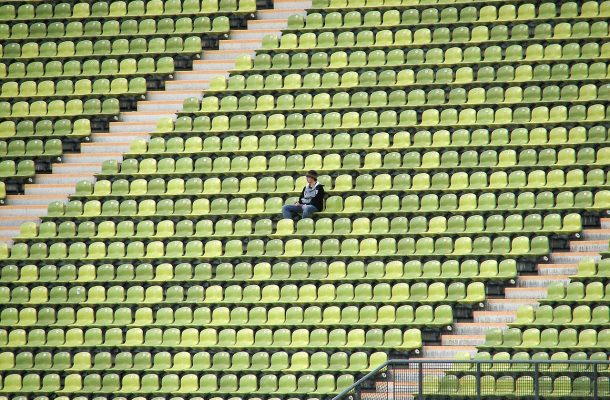7.8 billion is the loneliest number

We live on a planet with a superabundance of other humans which gets more crowded every day. Most people live in large cities, cheek by jowl with others, yet unconnected with their neighbours. Few people know their neighbour’s names, let alone take an interest in their wellbeing.
In Australia, Neighbourhood Watch was instigated because thieves were able to drive onto a property in Frankston, Victoria, load the possessions of the owners into a van and drive off without anyone intervening. This happened so often that the police encouraged the concept of people finding out more about their neighbours and becoming more aware of untoward activities.
People had to be taught to pay attention to their surroundings without becoming too close to be intrusive. Just to know that someone next door was on holiday, sick or just away for the day was enough to help reduce crime.
We live, as we dream, alone
People take their own lives when they feel they are not recognised, not wanted, inferior or out of touch with others – and our suicide rate is one of the highest in the Western world.
It appears that the more we crowd together, the less we communicate with those physically near us. Although social media theoretically brings us closer together online when we share our ideas, hopes, likes, dislikes and fears with strangers, we are becoming more distant in our physical interactions with those in our immediate vicinity.
We find it relatively straightforward to discuss the Amazon rainforest, the Rohingya ethnic crisis, volcanoes or earthquakes, or whatever else is in the news online, but we have difficulty facing racial inequality on our own doorstep. Local issues are discussed in terms of ‘they’ or ‘them’ needing to fix it. The idea of ‘us’ having to take personal responsibility seldom raises its head.
Even in clubs or societies it is only a very small proportion of members who are prepared to do the actual work. The majority are happy to sit back and accept membership without doing much to earn it by participating in the group, even by making the others feel welcome and a part of the whole.
I am a member of our local church. The congregation talk about love, sharing and mutual aid but when my wife went to hospital for three months after working on the church office for some years, not one member of the congregation came to visit her.
It seems that the more we are forced to live in less and less space, the more we put up barriers between ourselves and the outside world. Loneliness is not forced on us; we unwittingly encourage it to protect ourselves.
The mirage of social media
When we connect with others via social media, we tend to project what we perceive as our ‘good points’ in the main. When we socialise face to face, others can see – and hopefully accept – those aspects of our personalities which we like to keep private for a variety of reasons.
Body language, eye contact, the way we dress or comport ourselves are all missing when we communicate online. This is the reason so many people are tricked or fooled by others on the internet, sometimes into doing things they would normally abhor.
Those of us who grew up before social media learned at an early age to be more careful about who to trust. Admittedly, this was not always successful, but this wariness did give us some protection. Reliance on the media – traditional as well as social – means reliance on the projected images of strangers with their own agenda to pursue and this can be dangerous.
Face to face first
Loneliness can only be really overcome by face to face intervention. Words are not always necessary – the mere presence of others who care about us can be sensed and work wonders.
Social media is fantastic at distributing information, the problem is whether that data is accurate and or relevant to our lives. We have so much information available now that most of us are unable to assimilate it, and hence keep making the mistakes we always have when information was much less accessible.
The people who really affect our lives are those who go out of their ways to help and care for others. In any emergency it is usually the police, paramedics or firemen who are first on the scene, and so get the medals of recognition; rather than the average Aussie, but we can all do our bit to reach out and help each other when we can.
Maybe this is what we should consider when looking at ways to combat loneliness, suicide and drug problems. We should look at what we can do ourselves in the real world every day to reach out to others, rather than blaming social media or expecting ‘society’ or ‘the government’ to take responsibility.
RUOK?

Alan Stevenson spent four years in the Royal Australian Navy; four years at a seminary in Brisbane and the rest of his life in computers as an operator, programmer and systems analyst. His interests include popular science, travel, philosophy and writing for Open Forum.















Warren Brown
January 30, 2020 at 11:58 am
Alan, Your post is well put together, But you are describing a situation that is, I imagine, pretty common across Oz. We seem to have lost our empathy for others, we’ve all become insular to a degree that is disturbing. I suspect that the advent of social media has and is, facilitating this phenomenon.
Drivers are most unlikely to stop and give hitch hiker a lift. Why ? All sorts of unsavoury reasons pop up but I blame insularity, people don’t want to get involved or share space with others whom they don’t know.
From exposure to our ’Grey Nomads’ I know that meeting new people is a life warming experience. But which Grey Nomad would stop to give someone a lift ?
Alan Stevenson
January 31, 2020 at 8:55 am
As an addendum to the above, I have received some interesting comments. Firstly, the concept that loneliness is self inflicted. To a certain extent, I believe this is true. People who retire must have, or plan to have an absorbing activity which can be shared with others, whether it is an active sport, lawn bowls or stamp collecting.
Studies have linked loneliness to early mortality, increased cardio-vascular disease, poor mental health and depression, suicide, and increased social and health care costs. Well, obviously it leads to worry, stress, self pity and feelings of worthlessness.
While there is evidence of more loneliness among heavy social media users, there is also evidence suggesting social media use decreases loneliness among highly social people.
How do we explain such apparent contradictions, wherein both the most and least lonely people are heavy social media users?
Research reveals social media is most effective in tackling loneliness when it is used to enhance existing relationships, or forge new meaningful connections. On the other hand, it is counterproductive if used as a substitute for real-life social interaction.
Thus, it is not social media itself, but the way we integrate it into our existing lives which impacts loneliness.
However, not everyone likes participating in activities with others. Some like meditation, walking, art, camping or any other of the recreational hobbies like bee-keeping, etc. However, there are always others who have similar interests who are ready and willing to share their experiences.
We are told that we have a high suicide rate. But how does one define that? When a death occurs, we tend to assume it was accidental or due to natural causes. Some drownings, single car accidents, falls, etc can be attributed to suicide. But can we define the term? If someone just gives up and dies, is this suicide? If someone gives his/her life to save others; is in pain; is depressed by what he/she did/ didn’t do in a particular situation? We can never get completely inside another person’s head, so we can never really know. However, I am sure that the majority of suicides could have been prevented if someone had asked ‘are you OK?’
Many of us are afraid of contacting strangers. Do we pick up hitch-hikers? Do we talk to campers or people who are sleeping rough? Some of the nicest people I know have been on the road – either in a caravan or simply by cycling around the area where I live. I have found that most people are willing to stop what they are doing to chat, but the impetus has to come from me – a growing number have earphones which tend to form a barrier to conversation.
OK some people are happy being left to their own devices – the religious hermits, philosophers, those who want to live with the local animals, people who hate or fear others for whatever reason. Should we force our attitudes onto them? Possibly, but with caution. All humans are different